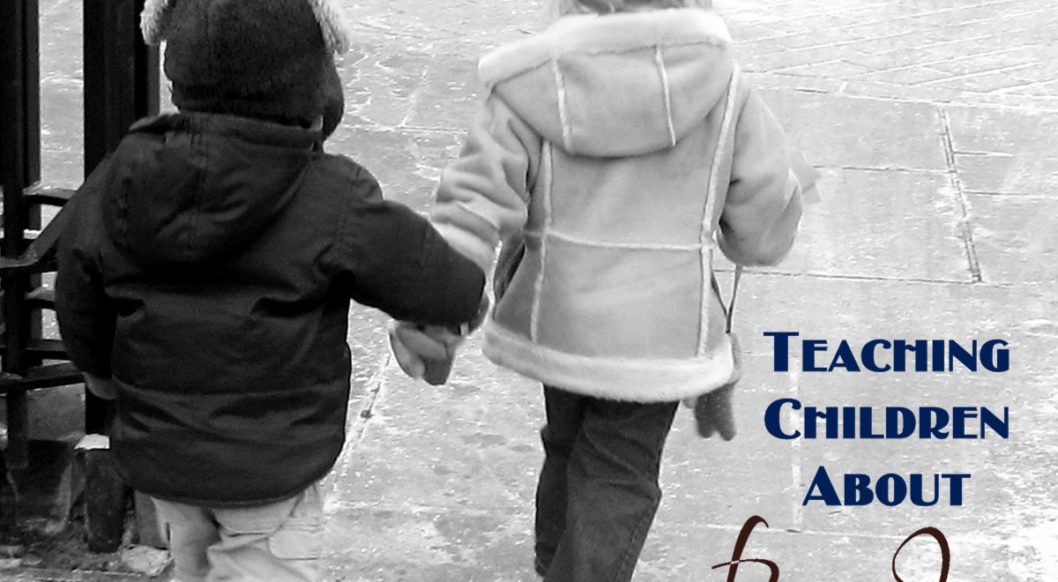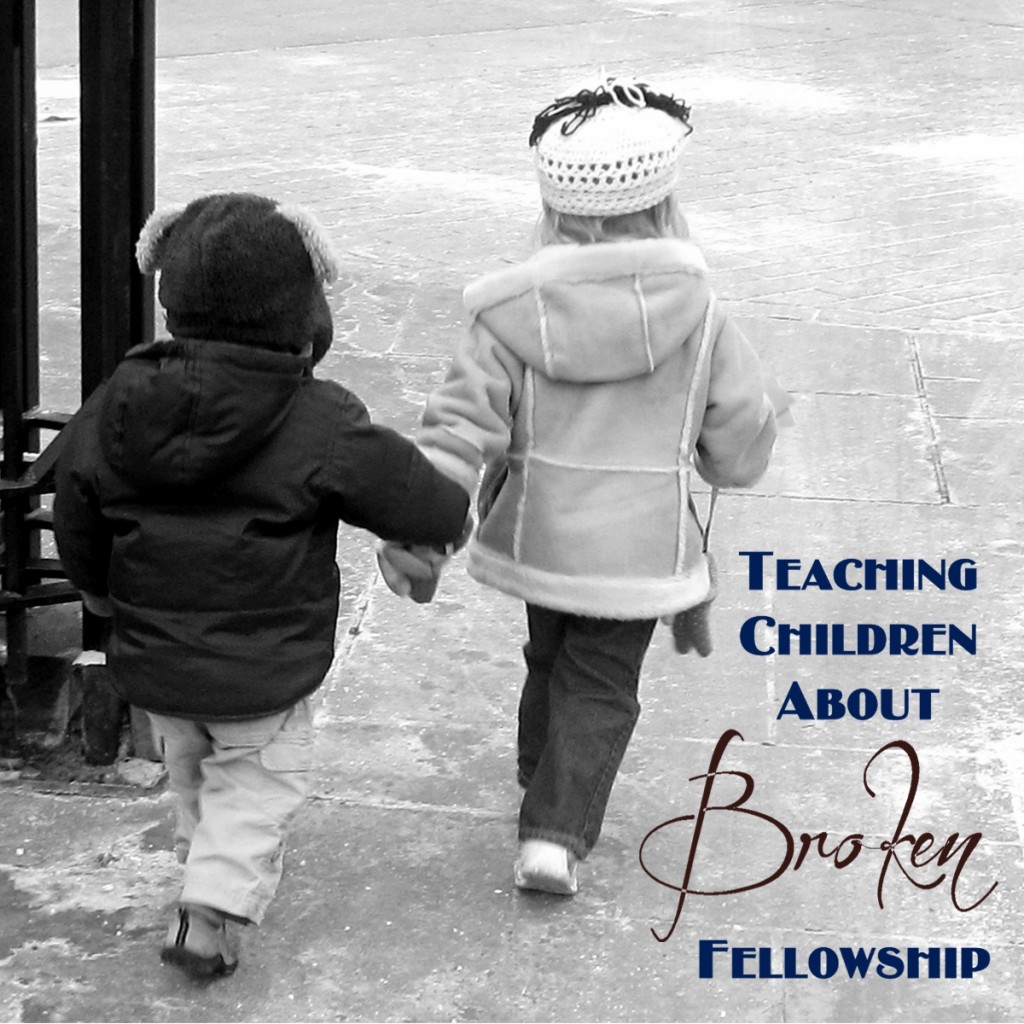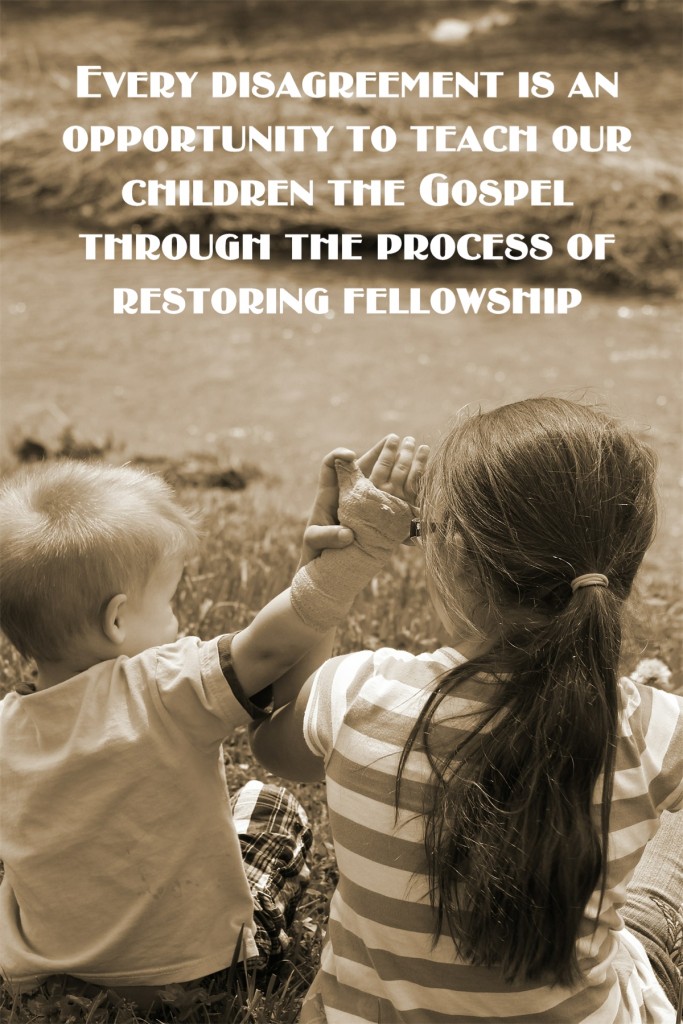Teaching Our Children About Broken Fellowship
Guest post by contributor Andrea
Last year when I was struggling as a mother of four kids under the age of four (including newborn twins), a dear friend gave me a book called “Loving the Little Years” by Rachel Jankovic. That little book has been read several times now, as well as the sequel, “Fit to Burst”. I love these books because they are short, and the chapters are short. They are random thoughts on motherhood in no particular order. I could usually finish a chapter while nursing the babies. It is chock full of humor, practical suggestions, encouragement, and lessons on motherhood – specifically in mothering little people.
Perhaps one of the reasons I “connected” with the author so well is that our children fall into the same birth order, two toddlers, then twins (and now she has two other children). So many times I wondered if Rachel had been sitting in my living room watching me mother my children, and then gone home to write a chapter about it!
One of the biggest things I took away from this book was how to teach my children to restore fellowship. I’m sure you’ve been there – the kids are fighting over that same toy, again. One child gets mad and hits his sister, while the sister spouts off unkind names to her brother. And there you are, trying to figure out who had the toy first, who did what, and who gets the discipline.
I am always frustrated when this breaks out in our home! {And it happens quite often…just saying.} But now I approach my teaching and discipline from a different perspective. Instead of dealing with who had the toy first, we talk instead about broken fellowship. You see, my children had both decided that the toy was more important than the fellowship with their sibling. They assigned more value to the item that to the relationship. They don’t realize they are doing that, but it provides a great opportunity to counsel them about sin and relationships.
We now go through questions something like this:
What is more important, your brother, or that toy?
What did you act like was the most important?
What should we do to show your brother he is most important?
How can you restore the fellowship?
It takes several counseling sessions to help your children understand the concept of fellowship. You want them to understand that relationships (people) are more important than things. If the rift in the fellowship is really bad, I do take away the toy. I explain that it would be better to throw the toy away than to have it in our house if we are going to break fellowship because of it. And when push comes to shove, the kids usually find a way to share the toy rather than have it thrown in the garbage.
To restore fellowship, the kids need to say something like, “I’m sorry I wasn’t kind and I broke fellowship with you. Will you please forgive me?” Then they hug, and make-up.
This has not only been very helpful in solving fights, but it is also a valuable opportunity to teach them about the Gospel. Every one of us is born into broken fellowship with God. The only way to restore fellowship is to ask Him to forgive our sins through the blood of Jesus, and to come into our life and be our Savior. Even as Christians, we experience broken fellowship with our Lord on a daily basis every time we sin. But the fellowship is easy to restore when we ask for forgiveness.
Every time my children my children experience broken fellowship with each other, I get to illustrate their broken fellowship with God. I am praying that one day soon my oldest will understand more completely and choose to accept Christ and the restored fellowship He offers.
Lessons from a 5 Year Old
I'm always learning something from my kids. Sometimes it's because they're just not afraid to say things as they see them. Sometimes it's because they see the world from a different perspective than adults who like to over-complicate things.
I think I may have to start a regular series on things I've learned from my kids.
Today my little boy said, “Mom, if people are poor and need clothes and food, and we don't help them, we're disobeying God, aren't we?”
I had to agree that he was right and then quoted James 4:17 to him: “Therefore to him that knoweth to do good, and doeth it not, to him it is sin.”
The Bible is clear that not doing right things is just as much sin as doing wrong things.
But, maybe we feel that we're excluded because we don't personally know anyone that needs clothes or food.
In our minds, ignorance is bliss.
But ignorance is actually sin.
If you truly wanted to find someone to help, you wouldn't have to look very far. They're living in your community. They're homeless, living their life in a vicious cycle of hopelessness. They're your co-workers, experiencing marital problems. They're your neighbors, depressed and feeling like life is pointless. They're the children playing in your neighborhood, with parents too busy to care about their physical or emotional needs. They're the unwed pregnant mothers, faced with difficult decisions. They're cashiers at the grocery store, addicted to drugs, and finding their life spiraling out of control. They're members of your very own church, struggling with financial stress, but you haven't cared enough about them to get to know them and their needs.
God forgive us.



